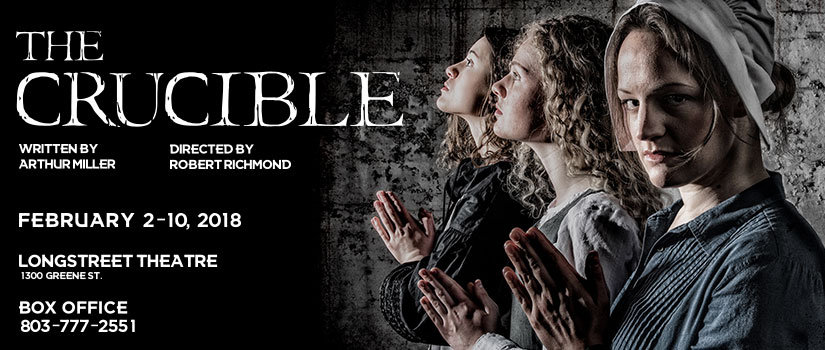The University of SC Department of Theatre and Dance will present The Crucible, Arthur Miller’s timeless parable of intolerance and injustice, February 2-10 at Longstreet Theatre.
This Tony® award-winning American classic about a community wrecked by religious fanaticism resonates as much today as it did when it premiered in 1953. Based on historical records, The Crucible portrays the tragic horror of the Salem witch trials of 1692. After being accused of breaking the town’s strict moral codes, a group of teen girls claim to have been overtaken by witchcraft. Their finger-pointing causes an epidemic of paranoia in the town, leading to a harrowing and deadly inquisition that leaves no one safe from suspicion. “A powerful drama” — The New York Times.
Director Robert Richmond and his creative team have designed a stage production that removes the often-performed drama from its historical setting, choosing to let the play’s enduring themes take center stage in a stark, institutional environment that immerses the audience in the action. He says the initial inspiration came in the form of a classic Victorian operating theatre, in which surgeries were performed with audiences in surrounding tiered seating.
“We began with the usual ideas of the large set with wooden planks and nooses and that kind of thing,” says Richmond, “but then decided that in order to bring the story into the 21st century, it needed to be set somewhere else. Being in the round, Longstreet Theatre has always struck me as similar to a Victorian operating room, where the audience are participating and are fully seen inside of the story, and it felt like a good fit because you’re putting the relationships and events under a very close microscope in that space.”
“It really could be any time or place,” he adds. “This could be a very strange and isolated sect in rural parts of the United States today, or it could feel as though it were something from yesteryear.”
Miller wrote The Crucible as an allegory that drew parallels between the Salem witch trials and the Communist “witch-hunts” led by Senator Joseph McCarthy and the House Un-American Activities Committee in the 1950s. Miller himself was famously brought to testify before the committee, who found him in contempt for refusing to name suspected Communists.
Without giving too much away, the ending of the play is sort of a result of every piece of ‘fake news’ you could possibly imagine, and shows just how destructive we can be to each other in that way. - Robert Richmond, Director
Richmond says the play has just as much connection to society today. “I think we are living in a world right now where the accuser is always innocent,” he says. “And, as in the play, you only have to call someone a witch and, because there’s no physical or tangible proof, they are. They’re guilty first and then have to prove their innocence, which is almost impossible. I also think this play right now shows how immovable the law can be. The prosecutors in this play cannot see gray — it’s black or white — and we’re taught a lesson about how we’ve got to hear both sides in order to reach justice.”
In keeping with bringing the play to a modern sensibility, Richmond has assembled a racially diverse cast made up of undergraduate and graduate students, as well as guest artists, several of whom are alumni of the University’s theatre program. “We’re trying to represent the world in which we live,” says Richmond. “There are more layers and textures to the relationships and the family makeup in this production which has been fun to work on.”
Cast in the production are graduate-level actors Kimberly Braun, Gabriela Castillo, Kaleb Edley, Kim Gaughan, Libby Hawkins, Darrell Johnston, Nicolas Stewart, and Donavon St. Andre; undergraduates Kate Chalfant, Amber Coulter, Sam Edelson, David Neil Edwards, Olivia Hensley, Tristan Hester, Will Hollerung, Liv Matthews, John Romanski, and Cassidy Spencer; and guest artists Katrina Blanding, Hunter Boyle, Richard Edward III, Terrance Henderson, Jennifer Moody Sanchez, and Erica Tobolski. Designers for the production are graduate design students Randy Young (Scenic), Allison Newcombe (Lighting), and Molly Morgan (Costume), and guest artist Danielle Wilson (sound).
“It really reflects what it is to be human right here and right now,” says Richmond. “Without giving too much away, the ending of the play is sort of a result of every piece of ‘fake news’ you could possibly imagine, and shows just how destructive we can be to each other in that way. You’ve got an adult group of intellectuals, all men, believing every single word and utterance that comes out of the accusers’ mouths, and that’s really scary to me.”
For more information about The Crucible or the theatre program at the University of SC, contact Kevin Bush by phone at 803-777-9353 or via email at bushk@mailbox.sc.edu.
